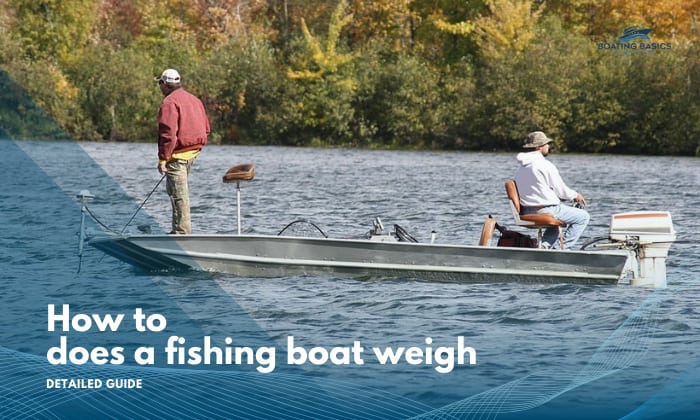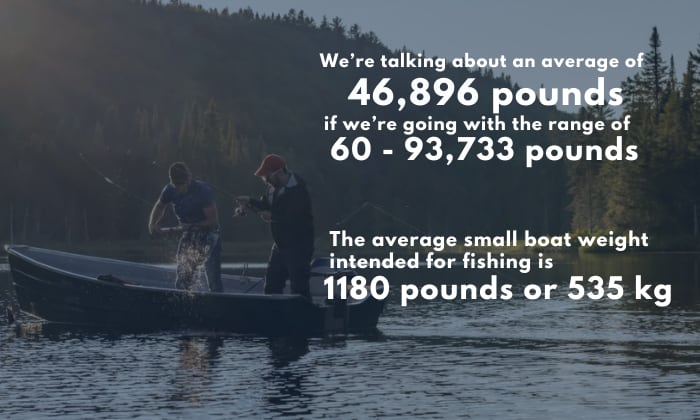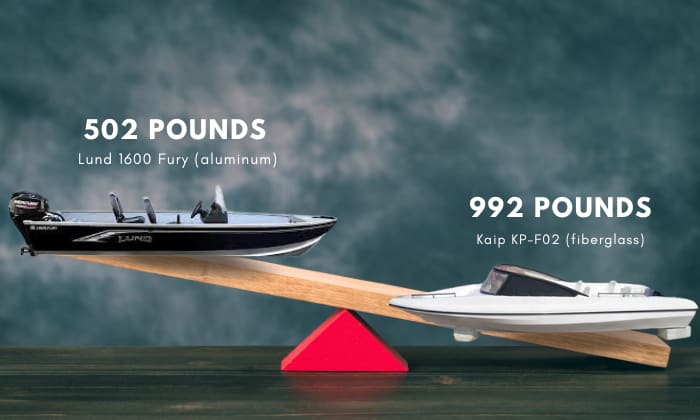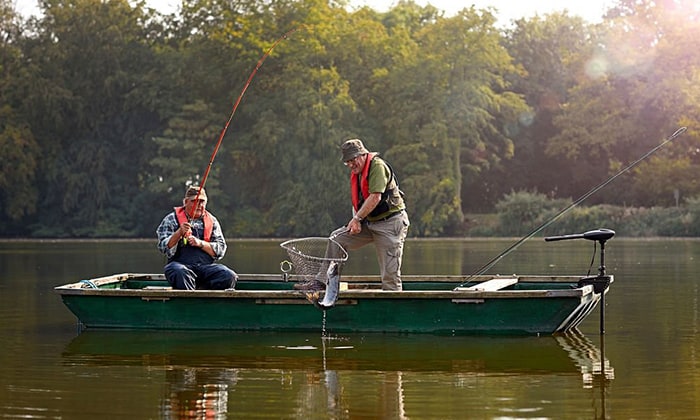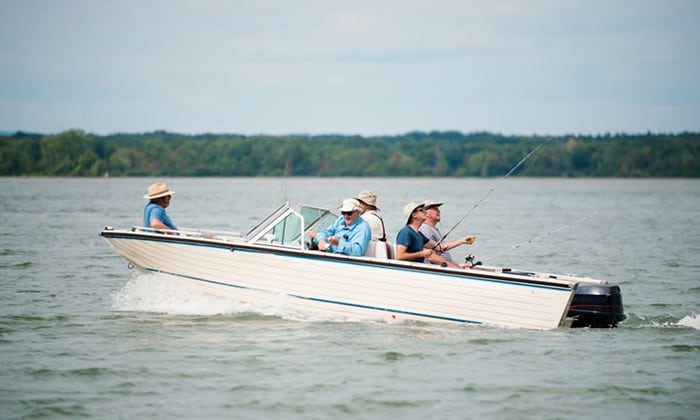Because “fishing boat” is too general a term, it’s difficult to provide an exact answer to “How much does a fishing boat weigh?” Based on length, type, and material alone, the discrepancies in weight become glaringly apparent.
The ever-popular Jon boat has an average weight of 650 pounds, but fiberglass center consoles push that up to 5,000 pounds.
Medium-sized commercial boats have an average fishing boat weight of 14,000 pounds, while the largest ones can weigh as much as a whopping 65,000 pounds.
|
Boat Sizes and Types with Their Average Weight |
||
|
Small |
Medium |
Examples of Specific Fishing Boats and Their Weights |
|
Kayak – 60 lbs |
Center Console –4,000 lbs |
Sportfishing Yachts – 93,733 lbs
|
|
Jon Boat – 650 lbs |
Cabin Cruiser – 14,000 lbs |
|
|
Fiberglass Fishing Boat – 2,300 lbs |
Standard Trawler – 17,000 lbs |
|
Table of Contents
The Average Weight of Fishing Boats
As you can see from the weight chart above, the range between the smallest fishing vessel to one of the largest is vast. We’re talking about an average of 46,896 pounds if we’re going with the range of 60 pounds to 93,733 pounds! That’s exactly 21,174 in kg!
Of course, that applies more as an all-encompassing range for most types. If we’re only going to consider small recreational boats only, which are arguably the most popular, then the average small boat weight intended for fishing is 1180 pounds or 535 kg.
These are the facts that are surmised based on my research:
- Boat size is directly proportional to dry or base weight. A 14 ft fishing boat will likely weigh a lot less than a 19 ft or 21-foot one, especially if they’re made with the same material.
- Builders prefer an aluminum boat because the material is naturally lightweight. As such, expect a fiberglass boat to weigh a lot more than the former, but tend to be more stable.
- Dry weight may sometimes not include the engine, which complicates this topic further. It’s also important to distinguish figures that actually account for both the fishing boat and trailer weight.
These are why it’s best to adopt a more focused approach when trying to determine the exact weight of a fishing boat.
Check the average weights based on common types as written in the table then compare it to the actual weight of your vessel. Better if you come across a reliable and accurate boat weight calculator.
Read more: Weight of a 17 foot boat.
Comparison Based on Material
Let’s not depart from aluminum and fiberglass when making a comparison since these are the top two materials used for your average small fishing boat.
We’ll be comparing two 16 foot vessels, namely the Lund 1600 Fury (aluminum) and the KP-F02 center console (fiberglass) by a Chinese manufacturer named Kaip.
- The Lund 1600 Fury weighs 502 pounds.
- The Kaip center console tops out at 450 kg or 992 pounds.
That’s almost twice the heft of the Lund offering, despite both vessels spanning the same length. This is why if you prefer a boat that’s easier to launch, then you should consider the Lund offering.
Fiberglass boats will be able to handle waves better and be generally more naturally stable, though.
Examples of Specific Fishing Boats and Their Weights
|
Boat Model |
Dry Weight |
|
2020 Lund 1775 Adventurer SS |
1,185 pounds |
|
2006 Carolina Classic 25 Express |
8,500 pounds |
|
2014 Boston Whaler 320 Outrage |
8,999 pounds |
|
2017 Grady-White Freedom 335 |
11,900 pounds |
|
HCB 65 Estrella |
65,000 pounds |
|
Viking 72 Enclosed Bridge |
129,696 pounds |
Factors Affecting the Weight of Fishing Boats
- Material – aluminum will almost always weigh less than fiberglass boats, and vice versa.
- Trailer Weight – we often need to figure out how much a boat weighs with its trailer (aka the combined weight) to ensure safe trailering, so this is still connected to this topic, however indirectly.
- Other Variables – much fishing equipment and accessories, supplies, as well as safety gear you bring onboard arguably affect the total weight of the boat.
Will you bring more tackle and bait than usual this time? How’s your cooler’s capacity? Perhaps, you’ll be installing a swankier, but heftier fish finder for this season? There are just way too many factors to consider.
How to Determine the Weight of a Fishing Boat
Calculating the total weight of a fishing boat is no different from finding out the heft of any boat. More often than not, this is fairly straightforward:
- You add up the individual weights of the components of the boat.
However, it doesn’t stop there as you, as the boat maker, also need to consider the displacement. How important is it? Well, it just determines how deeply your watercraft will sink into the water.
- To calculate it, we need to add the total value above with all the additional weight that the boat will be carrying (e.g. cargo, passengers, and fuel).
- Furthermore, it’s also vital to account for the water’s salinity and temperature.
Once we get the displacement, we can then calculate the hull’s volume to determine the safest waterline for the vessel. In short, boat weight paves the way for maximum capacity, which is the more important parameter.
Choosing the Right Fishing Boat
- Decide whether you’ll be doing mainly saltwater or freshwater fishing then choose vessels designed for either one.
- Choose inshore, offshore, or nearshore offerings based on what fish you prefer to catch. These ultimately determine the shape and depth of the hull you should go for.
- Usually, deep-V hulls perform better in nearshore or offshore settings, while flat-bottomed or boats with shallow drafts thrive in inshore fishing.
- Favor a boat that will make your life easy. Usually, those that can hit the sweet spot in terms of live baitwells, fish finders, trolling motors, tackle centers, rod storage, and center consoles are the keepers.
- Choose the right length and motor power for your purposes.
Frequently Asked Questions
How does the weight of a fishing boat affect its performance?
Heavier fishing boats will be more stable, but their added heft (which translates to more water resistance) means they need more power to essentially move.
There’s also the question of where most of the weight is concentrated. Having more weight in the bow, for example, may dampen the vessel’s ability to trim properly. The heavier the weight, the more worried you should be about encountering this problem.
Can I tow a fishing boat with a small car?
As long as you don’t go past the recommendations and limitations indicated by the car manufacturer, there’s no harm in doing this. The vehicle should be able to handle the sum of the boat’s weight, motor, gear, and fuel relative to its maximum towing capacity.
Conclusion
The facts shared here are quite an eye-opener, huh? For instance, I definitely thought fishing boats don’t exceed 2,500 pounds. But that’s only true if we take commercial fishing vessels out of the equation.
While weight may not be as important a measurement as length, beam, or draft, I can argue that knowing the exact answer to “How much does a fishing boat weigh?” has its perks. You’ll know how stable your watercraft is and how easy (or hard) it is to launch your boat, for instance.

“My intention from the first day establishing Boating Basics Online is to provide as much help as possible for boaters who want to experience a first safe and convenient trip. So feel free to join us and share your beautiful journeys to the sea!”

